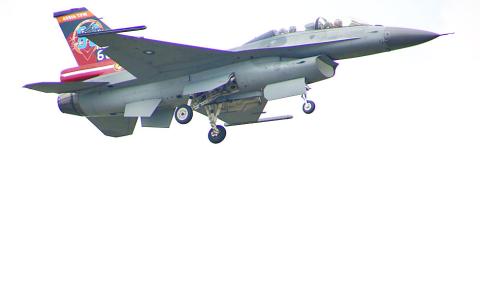Taiwan and the US have agreed to prioritize the development of indigenous depot-level maintenance and repairs for Lockheed Martin F-16s, a defense official said yesterday.
The program aims to make the nation self-sufficient in meeting the F-16Vs’ maintenance needs, as opposed to shipping the jets to the US for major repairs, said the official, who declined to be named.
Another benefit of the program is to make Taiwan the maintenance center for the F-16 family of jets in the Asia-Pacific region, the official said.

Photo: Lin I-chang, Taipei Times
The government has so far allocated NT$110 billion (US$3.55 billion) to upgrade the air force’s F-16A/Bs to F-16V standard, for which the US is to give Taiwan an US$800 million industrial cooperation credit, the official said.
When F-16 performance upgrade expenditures surpass NT$140 billion, additional industrial cooperation credits would become available, they said.
Depot-level maintenance and repair was the 17th item in the original version of the Taiwan-US F-16 performance upgrade industrial cooperation program, the official said.
However, after talks with US officials, the government decided to move depot level maintenance and repair capability to the top spot and to accelerate related work, the official said.
The government on May 24 began the initial evaluation for building an F-16 sustainment support center, allocating industrial cooperation credits totaling US$50 million for its use, the official said, adding that another US$450 million in credit is reserved for construction planning and preparation.
The Ministry of National Defense confirmed that the air force is to use the industrial cooperation credit for the center.
The center is to utilize the US military’s aircraft logistical management techniques, which would be transferred from Lockheed Martin Corp to the Chungshan Institute of Science and Technology, the ministry said.
The center is expected to be a boon for the nation’s aeronautics sector and provide valuable insight for developing the infrastructure to maintain future indigenous jets, it said.

NATIONAL SECURITY THREAT: An official said that Guan Guan’s comments had gone beyond the threshold of free speech, as she advocated for the destruction of the ROC China-born media influencer Guan Guan’s (關關) residency permit has been revoked for repeatedly posting pro-China content that threatens national security, the National Immigration Agency said yesterday. Guan Guan has said many controversial things in her videos posted to Douyin (抖音), including “the red flag will soon be painted all over Taiwan” and “Taiwan is an inseparable part of China,” while expressing hope for expedited “reunification.” The agency received multiple reports alleging that Guan Guan had advocated for armed reunification last year. After investigating, the agency last month issued a notice requiring her to appear and account for her actions. Guan Guan appeared as required,

A strong cold air mass is expected to arrive tonight, bringing a change in weather and a drop in temperature, the Central Weather Administration (CWA) said. The coldest time would be early on Thursday morning, with temperatures in some areas dipping as low as 8°C, it said. Daytime highs yesterday were 22°C to 24°C in northern and eastern Taiwan, and about 25°C to 28°C in the central and southern regions, it said. However, nighttime lows would dip to about 15°C to 16°C in central and northern Taiwan as well as the northeast, and 17°C to 19°C elsewhere, it said. Tropical Storm Nokaen, currently

PAPERS, PLEASE: The gang exploited the high value of the passports, selling them at inflated prices to Chinese buyers, who would treat them as ‘invisibility cloaks’ The Yilan District Court has handed four members of a syndicate prison terms ranging from one year and two months to two years and two months for their involvement in a scheme to purchase Taiwanese passports and resell them abroad at a massive markup. A Chinese human smuggling syndicate purchased Taiwanese passports through local criminal networks, exploiting the passports’ visa-free travel privileges to turn a profit of more than 20 times the original price, the court said. Such criminal organizations enable people to impersonate Taiwanese when entering and exiting Taiwan and other countries, undermining social order and the credibility of the nation’s

‘NATO-PLUS’: ‘Our strategic partners in the Indo-Pacific are facing increasing aggression by the Chinese Communist Party,’ US Representative Rob Wittman said The US House of Representatives on Monday released its version of the Consolidated Appropriations Act, which includes US$1.15 billion to support security cooperation with Taiwan. The omnibus act, covering US$1.2 trillion of spending, allocates US$1 billion for the Taiwan Security Cooperation Initiative, as well as US$150 million for the replacement of defense articles and reimbursement of defense services provided to Taiwan. The fund allocations were based on the US National Defense Authorization Act for fiscal 2026 that was passed by the US Congress last month and authorized up to US$1 billion to the US Defense Security Cooperation Agency in support of the